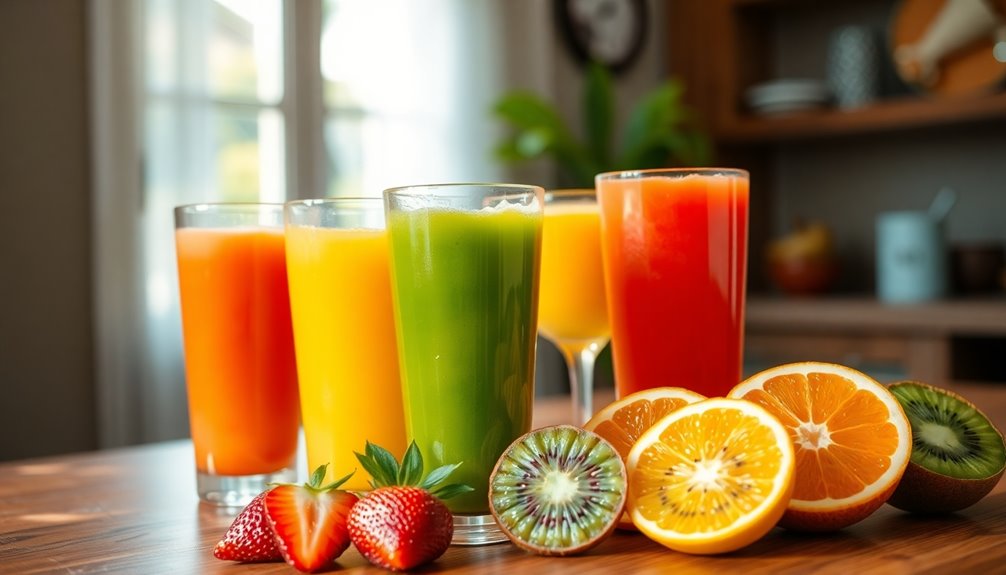To explore the health benefits of mixed fruit juices, focus on choosing 100% fruit juice without added sugars and fresh, nutrient-rich options. Incorporate a variety of fruits and consider diluting your juice with water to lower calorie intake. Monitor your body's response to juice and pay attention to fiber content. By experimenting with vegetable blends and juicing methods that retain nutrients, you can maximize the benefits. Keep going, and you'll uncover even more tips to enhance your juice experience!
Key Takeaways
- Choose "100% fruit juice" to avoid added sugars and ensure maximum health benefits from diverse vitamins and antioxidants in mixed fruit juices.
- Opt for freshly prepared or cold-pressed juices to retain sensitive nutrients and enhance antioxidant activity compared to processed varieties.
- Limit juice intake to 8 ounces daily to manage calorie and sugar consumption, prioritizing whole fruits for fiber and overall nutrition.
- Monitor your body's response to juice, including blood sugar levels and digestive comfort, for a balanced approach to consumption.
- Store homemade juices in airtight containers and refrigerate immediately, consuming them within 24-48 hours for optimal freshness and health benefits.
Understand the Nutritional Value of Mixed Fruit Juices

Mixed fruit juices pack a powerful punch when it comes to nutrition. They combine the benefits of various fruits, delivering a diverse range of vitamins and antioxidants. For instance, a mix of orange and pomegranate juice can give you high levels of vitamin C and potassium.
A typical serving of mixed fruit juice provides around 100-160 calories, with natural sugars often exceeding 20 grams. If the pulp is retained, some juices, like those with apple or pear, can also offer dietary fiber, which is great for digestive health. Additionally, combining fruits like mango and coconut water can create a tropical flavor while providing unique health benefits that enhance your overall well-being.
Choose 100% Fruit Juice Without Added Sugars

When you choose fruit juice, always read the labels carefully to guarantee you're picking 100% juice without added sugars.
Prioritizing whole fruit options can also boost your nutrient intake while keeping sugar levels in check.
Understanding the nutritional differences among juices helps you make better choices for your health.
Read Juice Labels Carefully
How can you guarantee you're making a healthy choice when selecting fruit juice? Start by choosing juices labeled as "100% fruit juice." This assures you're getting a product without added sugars or artificial ingredients, maximizing its health benefits.
Always check the ingredient list; terms like "juice drink" or "nectar" often indicate added sugars. Be cautious with juices labeled "from concentrate," as they may have lost some nutrients. Opt for "not from concentrate" when possible.
Additionally, pay attention to serving sizes on juice labels, as many contain multiple servings, leading to excess calorie and sugar intake.
Finally, look for juices enriched with nutrients like vitamin C to further boost the health benefits of your beverage choice. Drinking green juice can also provide additional vitamins and antioxidants, enhancing your overall nutrition.
Prioritize Whole Fruit Options
Prioritizing whole fruit options is crucial for maximizing your health benefits and minimizing added sugars. Whole fruits offer essential fiber that juicing often removes, making them a better choice for your diet. When you choose 100% fruit juice, you're still getting some benefits, but be cautious about portion sizes. Limit your intake to no more than 8 ounces a day to avoid excessive calories. Always read labels to verify you're selecting juice without added sugars. Here's a quick comparison to help you decide:
| Whole Fruits | 100% Fruit Juice | Added Sugars |
|---|---|---|
| High in fiber | Lower in fiber | Avoid at all costs |
| Fewer calories | Higher calories | Check labels |
| Nutrient-dense | Nutrient-diluted |
Make these choices to boost your health! Additionally, including whole fruits in your diet can provide vital nutrients like vitamins A, C, and K, which support overall health.
Understand Nutritional Differences
Understanding the nutritional differences between whole fruits and fruit juices is key to making healthier choices. When choosing juice, opt for 100% fruit juice without added sugars. This way, you avoid extra calories and potential health issues caused by excess sugar.
For instance, a cup of 100% orange juice gives you all your daily vitamin C needs while providing essential nutrients. Always read labels to steer clear of juice drinks loaded with added sweeteners, which diminish their health benefits.
Drinking up to 5 ounces of 100% fruit juice daily, like pomegranate or tart cherry juice, can enhance your antioxidant intake and contribute to your fruit consumption, ultimately supporting your overall health. Additionally, incorporating beet juice into your diet can further improve blood circulation and overall wellness.
Opt for Freshly Prepared Juices
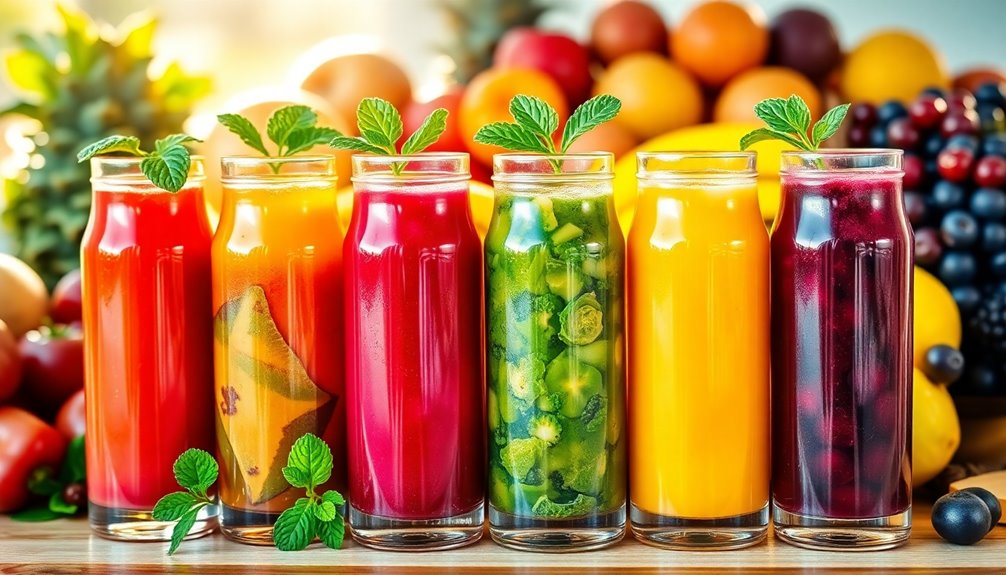
When you opt for freshly prepared juices, you're ensuring maximum nutrient retention and vibrant flavor. These juices are free from added sugars and preservatives, allowing you to enjoy their natural taste and health benefits. Plus, there's nothing quite like the freshness of a juice made right before your eyes. Additionally, incorporating exotic fruit blends can enhance both the flavor profile and nutritional value of your juice.
Nutrient Retention Benefits
Freshly prepared juices offer a significant advantage in nutrient retention, ensuring you get the most out of your fruit intake.
Unlike processed varieties, which often lose essential nutrients during storage, freshly made juices retain higher levels of antioxidants, including vitamin C, flavonoids, and carotenoids.
Cold-pressed methods further preserve these sensitive nutrients by avoiding heat, allowing you to enjoy their full benefits.
Studies show that antioxidant activity can be 2-5 times greater in fresh juices compared to their processed counterparts.
To maximize nutrient retention, consume your freshly prepared juices immediately, as exposure to air and light can degrade valuable vitamins and antioxidants.
Incorporating meal replacement juices into your diet can also provide essential nutrients while reducing calorie intake.
Embrace the power of fresh juices for a healthier, more vibrant you!
Avoid Added Sugars
Choosing freshly prepared juices over their processed counterparts is essential for avoiding added sugars that can undermine your health. Always opt for 100% fruit juices without sweeteners to maximize nutritional value and health benefits. Reading labels is key, as many drinks labeled as "fruit juice" contain minimal real fruit juice and high levels of added sugars. Freshly squeezed juice retains more nutrients than processed juice and can provide greater health benefits.
| Type of Juice | Added Sugars | Nutritional Value |
|---|---|---|
| Freshly Prepared Juices | None | High |
| Commercial Juices | High | Low |
| 100% Fruit Juices | None | Moderate to High |
Taste and Freshness
Opting for freshly prepared juices not only enhances your drinking experience but also guarantees you're getting the most nutritional benefits.
Fresh juices retain more nutrients and antioxidants compared to bottled options, ensuring you enjoy a vibrant taste packed with health benefits. When you make your own mixed fruit juices, you can customize them to your taste, avoiding added sugars and preservatives often found in commercial products.
This freshness not only improves the flavor profile but also encourages you to consume more fruits and vegetables, boosting your overall nutrition. By incorporating a variety of fruits, you'll maximize the intake of essential nutrients, enhancing both your enjoyment and health. Additionally, freshly prepared juices can include ingredients like parsley, which is rich in vitamins A, C, and K, promoting overall health.
Incorporate a Variety of Fruits

Incorporating a variety of fruits into your mixed juices not only enhances the flavor but also boosts the nutritional value of your drink. By blending different fruits, you achieve greater nutritional diversity, as each fruit offers unique vitamins and antioxidants that contribute to your overall health.
For instance, mixing orange juice, rich in vitamin C, with pomegranate juice, packed with vitamin K and antioxidants, supports immune function and promotes heart health. Combining cranberries with apple juice amplifies health benefits, while a mix of berries like acai and blueberries increases antioxidant levels, potentially reducing heart disease risk.
Aim for a colorful array of fruits; the variety guarantees a broader spectrum of nutrients, enhancing the health benefits of your juices.
Dilute Juices With Water for Lower Calorie Intake

While enjoying your favorite fruit juice can be invigorating, diluting it with water offers a smart way to cut calories without sacrificing flavor.
By mixing 4 oz of juice with 4 oz of water, you can achieve a lower calorie intake while still enjoying the vitamins and antioxidants that juice provides.
The American Heart Association recommends limiting sugary beverage intake, including undiluted fruit juices, to avoid excessive sugar content.
Diluting fruit juices not only enhances hydration but also helps manage blood sugar levels more effectively.
Plus, it extends your juice supply, letting you savor the taste without the high sugar load.
Balance Juice Consumption With Whole Fruits

When you're enjoying mixed fruit juices, remember that whole fruits pack a nutritional punch that juice often lacks.
Whole fruits provide essential fiber, which is vital for your digestive health and helps reduce the risk of chronic diseases.
To meet your daily fruit intake, aim to balance juice consumption with whole fruits for the best health benefits.
Nutritional Value Comparison
Although mixed fruit juices can be a tasty way to boost your vitamin intake, they often fall short in nutritional value compared to whole fruits. Juices are typically high in sugar and calories; for instance, one cup of orange juice has about 110 calories, more than double that of a whole orange.
The U.S. Dietary Guidelines recommend that at least half of your daily fruit intake should come from whole fruits to guarantee you get enough fiber content and nutrients. While mixed fruit juices can help meet your fruit needs, relying solely on them can lead to excessive sugar intake. Additionally, antioxidants found in whole fruits support overall health by combating oxidative stress.
Balancing juice consumption with whole fruits maximizes health benefits and supports better overall nutrition.
Fiber Importance in Diet
Fiber plays an essential role in your diet, especially when balancing juice consumption with whole fruits. Whole fruits provide dietary fiber that aids digestion, controls blood sugar levels, and promotes fullness.
Here's how you can maximize your fiber intake while enjoying fruit juices:
- Choose whole fruits over fruit juices to boost fiber intake.
- Aim for at least half of your daily fruit intake to come from whole fruits.
- Combine fruit juices with high-fiber snacks like nuts or seeds.
- Monitor your blood sugar by limiting juice portions and prioritizing fiber-rich foods.
Recommended Daily Intake
To maintain a healthy diet, it's crucial to balance your fruit intake between whole fruits and fruit juices. The U.S. dietary guidelines recommend adults consume 1.5 to 2 cups of fruit daily, with at least half from whole fruits.
Whole fruits provide fiber, which fruit juices are high in calories and sugar lack. For children aged 1-3, limit fruit juice to 4 ounces, while those 7 and older can have up to 8 ounces. Adults should also restrict juice intake to no more than 8 ounces per day.
This balance helps maximize health effects, like a lower risk of heart disease and type 2 diabetes, while ensuring you still get plenty of vitamins, particularly vitamin C, from whole fruits and vegetables. Additionally, emotional and psychological growth is essential for overall well-being, highlighting the importance of a balanced diet in supporting healthy development.
Be Mindful of Sugar Content in Juices

When you're enjoying mixed fruit juices, it's essential to be mindful of their sugar content, as some varieties can pack in up to 32 grams of sugar per cup. Excessive sugar can contribute to weight gain and blood sugar spikes, so it's smart to limit your intake.
Here are some tips to help you enjoy fruit juices wisely:
- Choose "100% fruit juice" to avoid added sugars.
- Keep your serving size to 8 ounces or less per day.
- Dilute your juice with water or seltzer for lower sugar and increased hydration.
- Check the calorie content; for instance, 3.9 ounces of apple juice has 60 calories.
Being aware of sugar can help you reap the health benefits without the drawbacks!
Store Juices Properly for Freshness
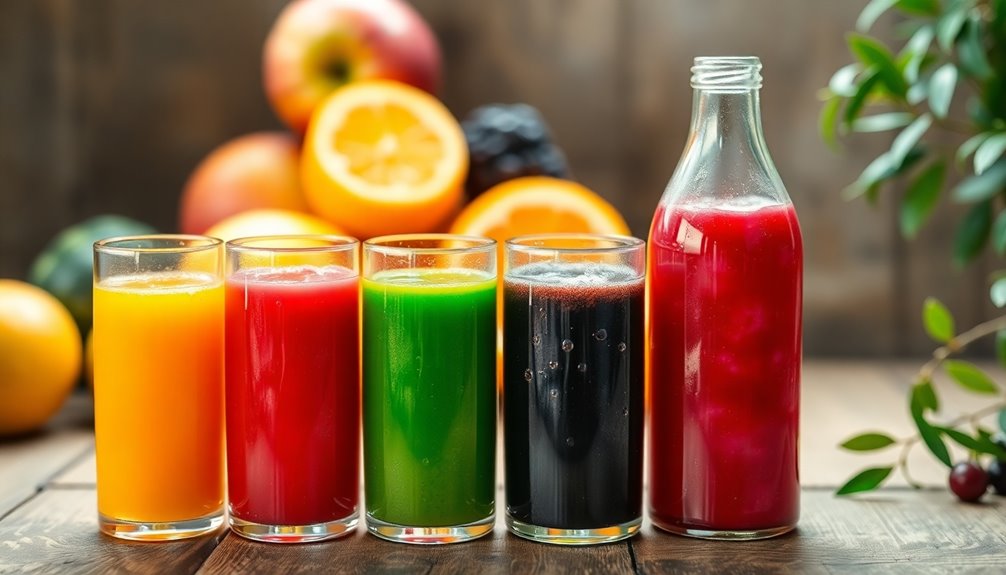
Enjoying mixed fruit juices can provide numerous health benefits, but proper storage plays a key role in maintaining their freshness and nutritional value. To maximize nutrient retention, store freshly squeezed or opened juices in airtight containers and refrigerate them immediately. Aim to consume homemade juices within 24-48 hours. For bottled juices, always check the "best by" date and choose those in dark containers. If you want to store juices longer, consider freezing them to preserve freshness for several months. Remember to shake or stir before consuming, as separation can affect taste and nutrient distribution.
| Storage Method | Freshness Duration | Nutrient Retention |
|---|---|---|
| Refrigerate | 24-48 hours | Moderate |
| Freeze | Several months | High |
| Dark Containers | Until "best by" | Moderate |
| Airtight Containers | Up to 48 hours | High |
| Homemade Juices | 24-48 hours | Highest |
Explore the Health Benefits of Specific Juices
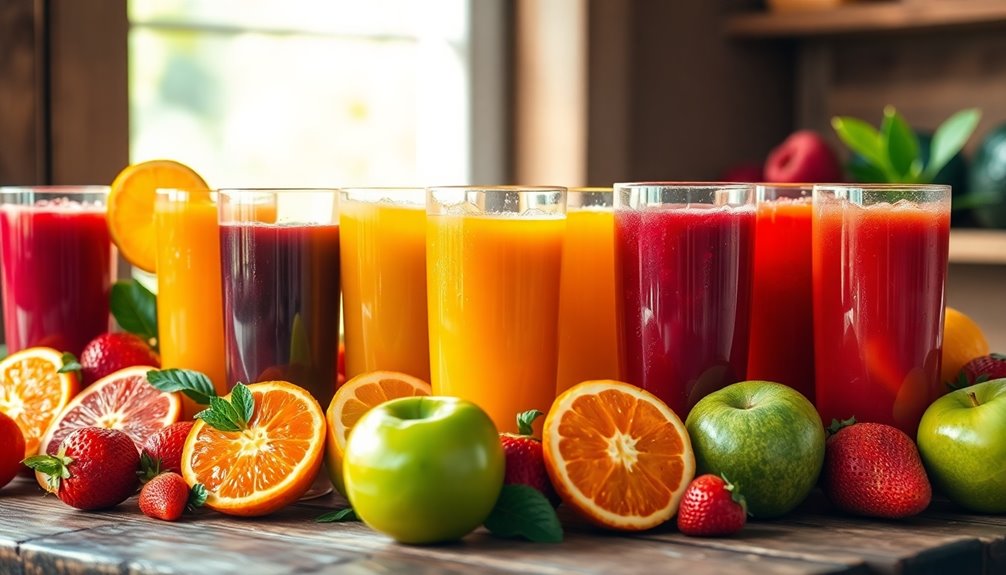
When you explore the benefits of specific juices, you'll find nutritional powerhouses packed with essential vitamins and antioxidants.
Each juice, from cranberry to beet, offers unique health advantages that can enhance your well-being.
Let's take a closer look at what these delicious options can do for you.
Nutritional Powerhouses Unveiled
Exploring the vibrant world of mixed fruit juices reveals a treasure trove of health benefits that can transform your diet. Packed with essential vitamins, minerals, and antioxidants, these delicious blends can enhance your overall well-being while satisfying your taste buds. Moreover, the hidden health benefits of fruit juices often go unnoticed, such as their ability to improve digestion, boost immunity, and provide a natural source of energy. By incorporating a variety of fruits into your beverages, you can ensure a diverse range of nutrients that support your health in numerous ways.
These nutritional powerhouses are packed with antioxidants and essential vitamins. Here's a quick look at some standout juices:
- Cranberry Juice: Rich in vitamin C, it helps lower urinary tract infection risk and supports immune health.
- Pomegranate Juice: High in vitamin K and anthocyanins, it reduces inflammation and supports blood clotting.
- Tomato Juice: A great source of lycopene, it's linked to reduced heart disease risk and boasts high vitamin C content.
- Beet Juice: Loaded with betalains, it may lower blood pressure and enhance athletic performance.
Incorporating these fruit juices into your diet can considerably boost your nutritional intake.
Health Benefits Overview
Mixed fruit juices offer a multitude of health benefits that can enhance your overall well-being.
Combining juices like pomegranate and orange packs a powerful punch of antioxidants, promoting heart health and reducing oxidative stress.
Adding cranberry juice can help lower your risk of urinary tract infections by 32.5%, thanks to its high vitamin C content.
If you're focused on digestive benefits, try mixing apple and prune juices for extra fiber that aids in relieving constipation.
For those into fitness, beet juice can support muscle recovery and help lower blood pressure.
Finally, a blend of tart cherry and orange not only fosters muscle recovery but also boosts your immune system.
Enjoy these delicious juices for a healthier you!
Limit Daily Juice Intake to Recommended Amounts

Limiting your daily intake of fruit juice is essential for maintaining a balanced diet and avoiding excessive sugar consumption. To support your health, adhere to these recommended amounts:
- Adults: Limit to 8 ounces per day.
- Children aged 1-3: Maximum of 4 ounces.
- Children aged 4-6: No more than 4-6 ounces.
- Children aged 7 and older: Up to 8 ounces.
Exceeding these limits can increase the risk of serious health issues, including premature death linked to high sugar intake.
To guarantee adequate nutrition, remember that at least half of your daily fruit intake should come from whole fruits, not juice.
Moderation is key to enjoying the benefits of mixed fruit juices while safeguarding your health.
Consider Juicing Methods That Retain Nutrients
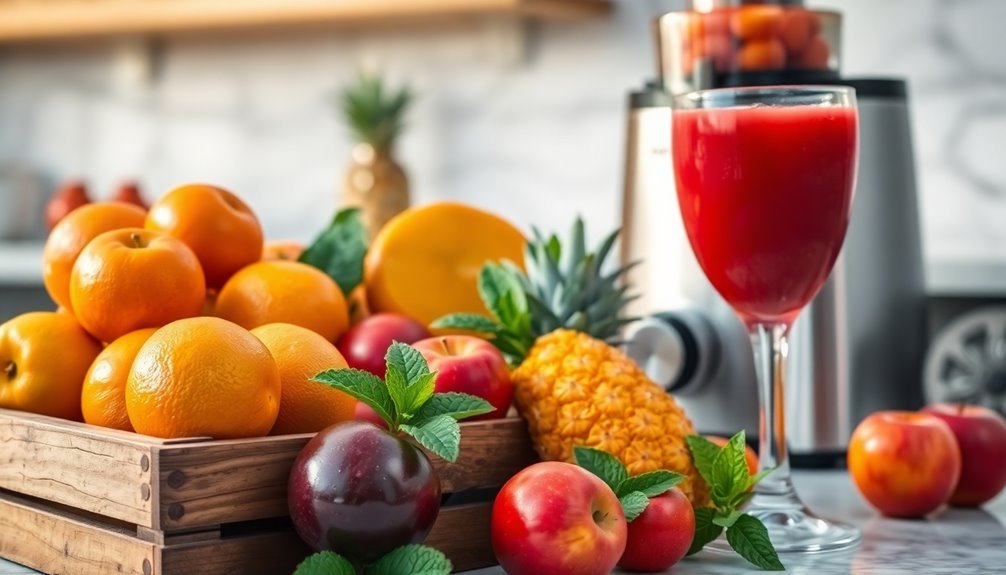
When you choose the right juicing methods, you can greatly enhance the nutritional value of your drinks.
Opt for cold-press juicers, as they crush and press organic fruits and vegetables slowly, helping retain nutrients like vitamin C and antioxidants. Avoid high-speed centrifugal juicers that can cause nutrient degradation due to heat.
Incorporating whole fruits and vegetables in your blends not only boosts flavor but also enhances the overall health benefits by preserving fiber and beneficial plant compounds.
To maximize nutrition, consume your freshly prepared juices immediately, as exposure to light and air can reduce their nutrient content.
Pay Attention to Fiber Content in Juices
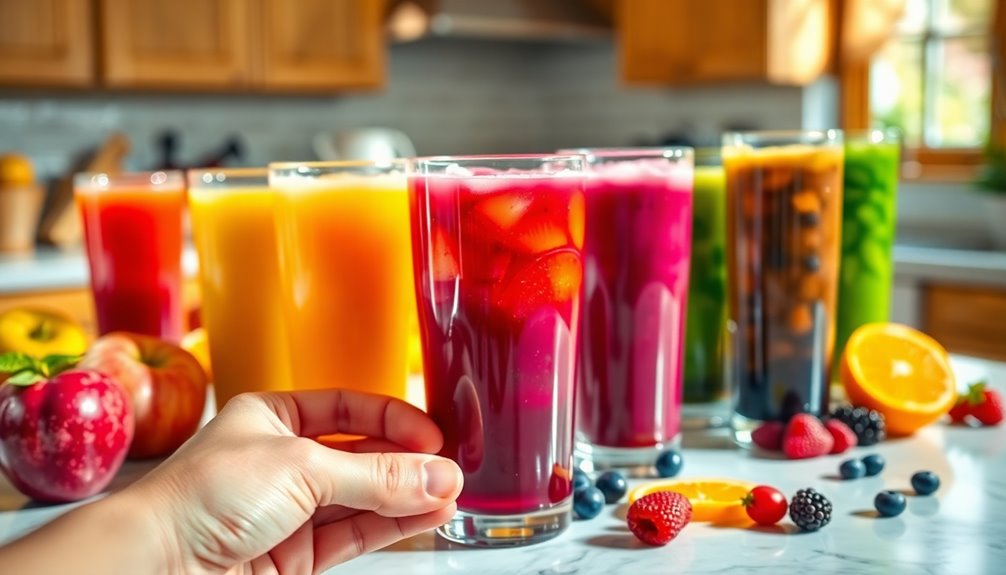
While enjoying the revitalizing taste of fruit juices, it's essential to pay attention to their fiber content. Juicing often strips away the fiber that helps regulate blood sugar levels.
To maximize health benefits, consider these tips:
- Choose whole fruits over juices to retain fiber that slows sugar absorption.
- Look for blended smoothies to keep more fiber intact, enhancing satiety and nutrient absorption.
- Be mindful of the calorie-to-sugar ratio; for instance, a medium apple has about 4 grams of fiber, while apple juice contains only 0.5 grams.
- Follow U.S. Dietary Guidelines, aiming for at least half your daily fruit intake from whole fruits to optimize fiber consumption.
Experiment With Adding Vegetables to Juice Blends
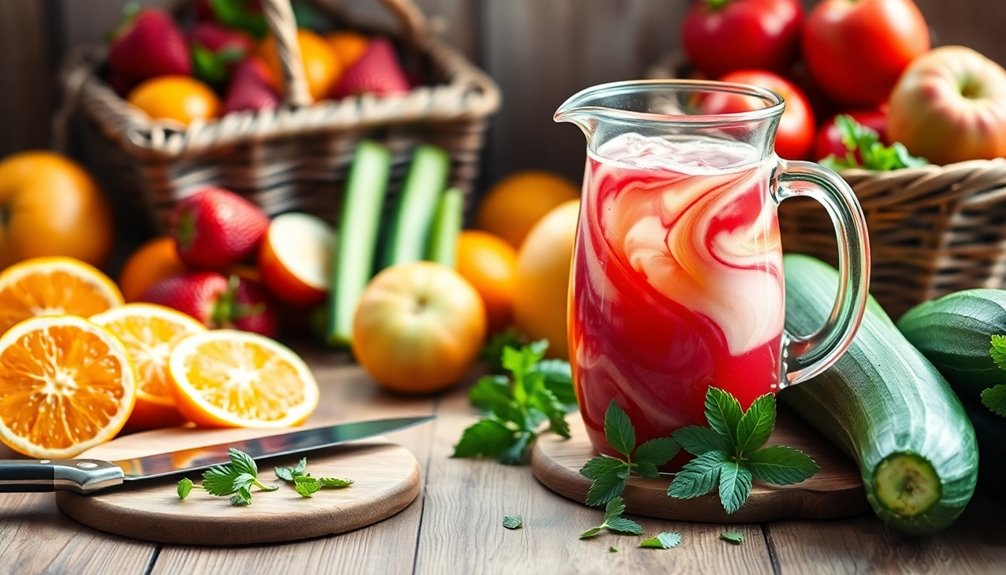
Adding vegetables to your fruit juice blends can elevate both the flavor and nutritional profile of your drinks. By mixing vegetable juices with mixed fruit juices, you can considerably reduce calories while enhancing health benefits.
For instance, combining one part fruit juice with two parts vegetable juice balances flavors and cuts sugar content. Vegetables like spinach, kale, carrots, and beets pack in antioxidants, vitamins K and A, and fiber, often missing in fruit-only options. Incorporating these veggies helps you increase your daily vegetable intake, which is essential for overall well-being.
Plus, hydrating vegetables like cucumbers and celery add invigorating taste without excess calories. Try experimenting with different combinations to find your perfect blend!
Monitor Your Body's Response to Juice Consumption

How does your body feel after enjoying a glass of mixed fruit juice? It's essential to monitor your body's response to juice consumption.
Here are a few things to pay attention to:
- Blood Sugar Levels: Watch for spikes due to high natural sugar content.
- Digestive Changes: Note any bloating or discomfort; this might indicate sensitivity or lack of fiber.
- Energy Levels: Keep track of fatigue or energy crashes post-consumption.
- Mood and Cravings: Record changes in mood or increased cravings for sweets, which can affect your overall health.
Being mindful of these factors helps you enjoy the benefits of juice while managing sugar, calories, and your body's reactions effectively.
Frequently Asked Questions
What Are the Benefits of Mixed Fruit Juice?
Mixed fruit juice offers a variety of health benefits that you'll appreciate.
It combines the nutritional power of different fruits, giving you essential vitamins, minerals, and antioxidants. By drinking mixed fruit juice, you boost your immune function and support heart health.
Plus, it helps you meet daily fruit intake recommendations easily. When you choose 100% fruit juice with no added sugars, you hydrate your body while enjoying a delicious, nutrient-rich beverage.
What Is the Major Downside of Drinking Fruit Juice to Meet Your Daily Fruit Needs?
The major downside of drinking fruit juice to meet your daily fruit needs is its high sugar content and lack of fiber.
Even 100% juice can pack in a lot of natural sugars, which can spike your blood sugar levels.
Plus, you miss out on the essential fiber found in whole fruits that aids digestion and regulates blood sugar.
Relying solely on juice could lead to nutrient deficiencies and increased health risks, so moderation's key.
What Are the Benefits of Eating Healthy Juices?
When you drink healthy juices, you're boosting your intake of essential vitamins and minerals. A glass of mixed fruit juice can hydrate you while providing heart-healthy potassium.
Antioxidant-rich options, like cranberry and pomegranate juice, help reduce inflammation and support cardiovascular health. Plus, by incorporating a variety of fruits, you enhance nutrient diversity in your diet.
Just remember, moderation is key to reaping these benefits without overdoing the sugar content.
What Are 5 Cons of Juicing?
Juicing might seem like a quick way to boost your nutrient intake, but there are some downsides.
First, you're losing valuable fiber, which aids digestion and stabilizes blood sugar.
Second, too much juice can lead to weight gain due to high sugar content.
Third, it may cause nutrient deficiencies if you rely solely on juices.
Fourth, juices can trigger cravings for sweets.
Finally, some juices are high in sodium, which isn't great for heart health.
Conclusion
Incorporating mixed fruit juices into your diet can truly elevate your health. Did you know that consuming just one serving of fruit juice daily can reduce the risk of heart disease by up to 20%? By being mindful of your choices—opting for 100% juice, adding veggies, and keeping an eye on sugar—you can enjoy delicious flavors while reaping incredible benefits. So, embrace the vibrant world of mixed fruit juices and toast to a healthier you!
Cindy thoroughly researches juicing trends, techniques, and recipes to provide readers with practical advice and inspiration. Her writing style is accessible, engaging, and designed to make complex concepts easy to understand. Cindy’s dedication to promoting the advantages of juicing shines through her work, empowering readers to make positive changes in their lives through the simple act of juicing.

